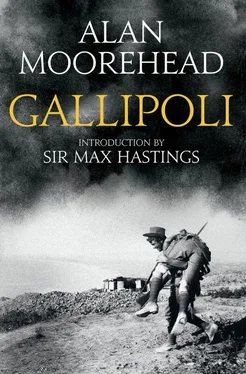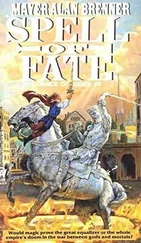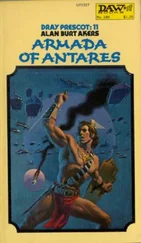According to Lewis Einstein, the American Minister in Constantinople, the Turks behaved very well over this incident. When the submarine was first abandoned and the British sailors were struggling in the water the Turkish soldiers on the shore jumped in and rescued them. The dead were first buried on the beach and then taken to the English cemetery at Chanak, where a service was said over them. ‘The Turks are extraordinary in this,’ Einstein wrote. ‘One moment they will murder wantonly, and the next surprise everyone by their kindness. Thus when the first English submarine prisoners were led into the hospital at Chanak, shivering in their wet clothes, the Turkish wounded called them guests, and insisted on their being given everything new, and such few delicacies as they possessed.’
It was only later when the prisoners were sent to filthy prisons in Constantinople that ill-treatment began, but even then in most cases it was the ill-treatment of indifference, of the squalor and callousness of the East rather than an act of deliberate revenge.
Meanwhile another warning had sounded on the Dardanelles. On April 19 a company of Turkish soldiers had made their camp in a fold of the hills on the western side of the peninsula. It was the usual early morning scene: the soldiers asleep on the ground, the smoke of the first cooking fires rising upwards and the lines of horses and mules tethered nearby. Then without warning the terrible searing rush of shells filled the sky and everything was in an uproar of cascading earth and bursting shrapnel. Some thought it was an earthquake and lay still in terror, others ran to the lines of screaming animals and tried to mount and get away, others again who kept their wits went to their guns. But they could see nothing on the flat and deserted sea, nothing but a tiny yellow balloon on the far horizon. It was not until after the campaign that the Turks learned that this was the Manica , the first of the British kite-balloon ships, trying out a new artillery spotting device. While the vessel still lay below the horizon out of sight from the land two observers had gone up in a wicker basket attached to the balloon at the end of a long vertiginous swaying cable, and, with the first light of the morning, had seen through their binoculars the peaceful encampment in the hills. It was an easy matter then for the encampment’s position to be fixed on the map and the news to be telephoned down to the Manica’s bridge below; and it was the shells of the cruiser Bacchante lying unseen still further out at sea that fell, so miraculously, out of the empty sky on to the sleeping Turks.
And then, a day or two later, a heavy British air-raid, the first of the campaign, fell on Maidos at the Narrows. Seven 100-lb. bombs, an unheard-of kind of missile in the Mediterranean at this time, set the town on fire.
After this there was silence again. No more ships attempted to enter the straits and no gun was fired on either side. The weather continued to be unsettled and cold. Among the Turks, who had now been given almost five weeks in which to prepare their defences, nothing remained to be done but to wait — to post their watchers on the hill tops and the cliffs, to keep gazing out to sea by day and sweeping the straits with their searchlights at night. The dread of the coming invasion was everywhere about them; but where it would fall, and at what hour of the day or night, and what it would look like when it came — of all this they had no notion at all.
‘A voice had become audible, a note had been struck, more true, more thrilling, more able to do justice to the nobility of our youth in arms engaged in this present war, than any other… The voice has been swiftly stilled.’
Winston Churchill in a letter to The Times, April 26, 1915.
THERE was a fever of excitement about the ‘Constantinople Expedition’ among young men in England. ‘It’s too wonderful for belief,’ Rupert Brooke wrote as he was setting out. ‘I had not imagined Fate could be so kind… Will Hero’s Tower crumble under the 15-inch guns? Will the sea be polyphloisbic and wine-dark and unvintageable? Shall I loot mosaics from St. Sophia, and Turkish Delight and carpets? Should we be a Turning Point in History? Oh God! I’ve never been quite so happy in my life I think. Never quite so pervasively happy; like a stream flowing entirely to one end. I suddenly realize that the ambition of my life has been — since I was two — to go on a military expedition against Constantinople.’
Rupert Brooke, with his romanticism, his eagerness and his extreme physical beauty, is the symbolic figure in the Gallipoli campaign. One feels that he was destined to be there, that among all these tens of thousands of young men this was the one who was perfectly fitted to express their exuberance, their secret devotion, their ‘half joy of life and half readiness to die’. [8] A phrase of Desmond McCarthy’s in a preface to Ben Kendim by Aubrey Herbert.
He was just twenty-seven at this time, and the circumstances of his life were almost too good to be true. There had been his lyrical schooldays at Rugby, where he was liked by everybody and where he was in all the teams, and all the literary honours were his. Then Cambridge with the dabblings in socialism, the amateur theatricals, the sittings-up all night, the ramblings through the countryside talking of Oscar Wilde and singing all the way. Like T. E. Lawrence later on he had met and captivated almost everyone who counted in London, from the Asquiths and the Churchills to the Shaws and Henry James. He had travelled everywhere (though always at the end of a thread that tied him to England), and just before the war had been searching for lost Gauguins in Tahiti in the South Pacific. It was Churchill who had obtained for him his commission in the Royal Naval Division which had gone first to Antwerp and was now committed to Gallipoli. More than ever, on the eve of this new adventure, the poet was the hero of Mrs. Cornford’s poem:
A young Apollo, golden-haired,
Stands dreaming on the verge of strife,
Magnificently unprepared
For the long littleness of life.
Brooke’s own war sonnets were soon to be on everybody’s lips:
Now, God be thanked who has matched us with His hour,
And caught our youth, and wakened us from sleeping…
Blow out you bugles, over the rich Dead!
If I should die think only this of me;
That there’s some corner of a foreign field
That is for ever England.
All this — the charmed life, the beauty, the immense promise of his talents — was now to be risked in battle in the classical Ægean. It was indeed almost too wonderful for belief.
As always, Brooke was surrounded by his friends. There was young Arthur Asquith, the Prime Minister’s son; Aubrey Herbert, the orientalist who ‘went to the East by accident as a young man may go to a party, and find his fate there’; others like Charles Lister and Denis Browne who would certainly have been something in the world had they not been about to die. To these, new friends were constantly being added; men like Bernard Freyberg, who was in California when war broke out and came back to England to enlist. He joined the Naval Division.
Soon they were all together in Egypt, living in tents, driving out to the desert to see the pyramids by moonlight, a dedicated group ringed about with its own code and its excitement in the adventure that lay ahead; and they were completely happy. Then Rupert Brooke went down with sunstroke, and the Commander-in-Chief (whom of course he had known in England) called on him in his tent. When Hamilton offered him a place on the headquarters staff Brooke refused; he wanted to be at the landing on Gallipoli with his men.
Читать дальше












